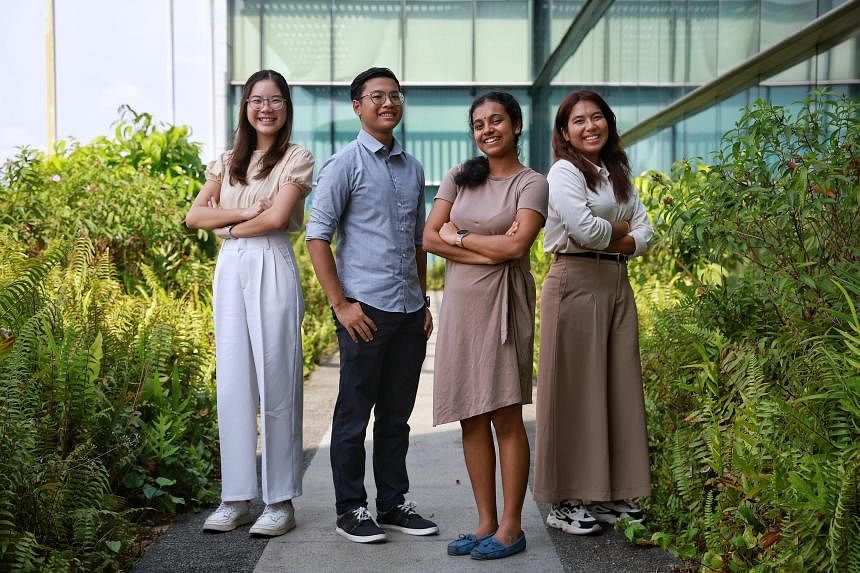SINGAPORE - Starting from August 2023, freshmen joining the National University of Singapore (NUS) to study dentistry, medicine, nursing and pharmacy will take a common set of modules in their first two years, alongside their current individual programmes.
NUS on Tuesday announced that about 870 first-year students across the four healthcare disciplines will take five courses together, as part of a new common curriculum for healthcare professional education that has been designed with Singapore’s preventive care strategy Healthier SG in mind.
The aim is to imbue in students a greater awareness of social issues and their impact on health, as well as cultivate teamwork, communication skills and digital literacy.
The five courses – each of which will be completed within 13 weeks – will cover topics such as how social and environmental factors influence health outcomes, and data literacy for healthcare.
Students will also learn about working and communicating in multidisciplinary teams, as well as the legal and ethical principles underpinning the practice and delivery of health services.
They will also explore aspects such as computational thinking, data science, artificial intelligence and machine learning in the healthcare context.
Lessons will be conducted through a mix of online and in-person classes.
Students from the four healthcare disciplines will also form mixed teams to visit patients in their homes regularly over a year so that they can apply concepts they learn in class about providing holistic patient care as well as fostering empathy.
Professor Aaron Thean, NUS deputy president for academic affairs and provost, said the changes are a big step in reforming healthcare education to make it more relevant for Singapore’s needs. This is the first time that all four healthcare disciplines are working together, he said.
Professor Chong Yap Seng, dean of the NUS Yong Loo Lin School of Medicine, said: “Health and well-being are more than just caring for the sick. To help people stay healthy as long as they live, and better care for them when they are ill, we need to look beyond the traditional confines of medicine and science, and draw upon other disciplines.”
“Health sciences education should prepare tomorrow’s doctors, nurses, dentists and pharmacists to harness the power of artificial intelligence, computing, business analytics, even music and the arts, in the provision of holistic, patient-centric healthcare,” he added.
Adjunct Professor Lau Tang Ching, vice-dean for education at NUS Medicine, said: “This is something that we have dreamed of since about 10 or 15 years ago – the different schools and faculty have actually always wanted our different professional student groups to come together to learn together.
“But it was very difficult to organise common time for them.”
To free up space for a common curriculum, which makes up 10 per cent to 12 per cent of the overall course load for students, the schools cut back on repetitive content after a review. Courses with similar content across the four disciplines were consolidated.
All first-year medical students in the current academic year 2023/2024 will also need to complete a Minor in Biomedical Informatics during their undergraduate years.
The curriculum combines healthcare, data science, artificial intelligence and information technology to equip students in using data effectively to improve patient outcomes and information flow across healthcare IT systems.
Prof Chong said this minor was made compulsory to underscore the importance of medical students being equipped with digital skills.
“We don’t want to wait for our doctors to become outdated… by 2027, I’m pretty sure everything is going to be digitalised and AI will be commonplace. So a lot of the tasks that normal house officers do will be completely enhanced by AI, like writing up medical reports,” he said.
From the current academic year, undergraduates from other NUS faculties, schools and colleges can also take up a new Minor in Integrative Health offered by NUS Medicine to learn more about modern healthcare systems.
Students taking this programme, which aims to develop an interdisciplinary mindset in solving complex health issues, will complete five courses over two years or more.
It will start with 50 students, with the intake possibly growing over the next three years.
Professor Bernard Tan, senior vice-provost for undergraduate education, at NUS, said: “Some people will say that in the past, our health sciences curriculum move very slowly. Now that we have done this very major revision, it is also the intention of the university to signal to the rest of the community… that we are prepared to move forward as fast as is needed, in tandem with the developments in the healthcare scenario in Singapore.
“To facilitate this move towards preventive health care and ageing in place, we cannot be training our health sciences professionals like what we did in the past – wait for people to fall sick, and then we fix them.”
Second-year dentistry student Hilary Moh, 21, who took one of the common curriculum courses – social and behavioural determinants on health – as part of a pilot in 2022, said she is better able to see how her field fits into the bigger picture of healthcare, instead of focusing solely on oral care.
Ms Yunn Honey Aye Kyaw, 19, who is in her second year of NUS Medicine and also took the course, said: “I initially went into medicine thinking only about the physical aspects of health, so it is eye-opening to see the non-medical factors that affect patients’ health.”


